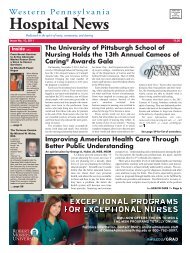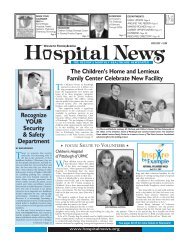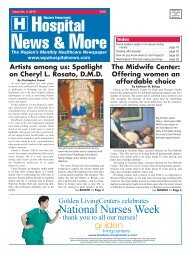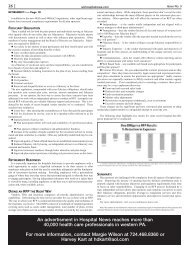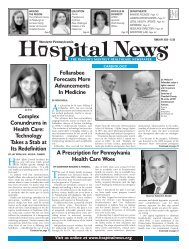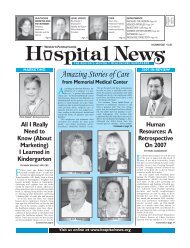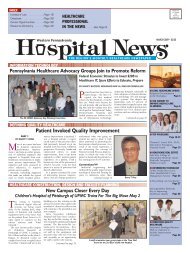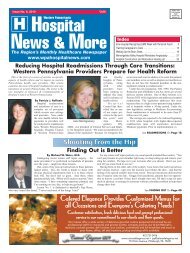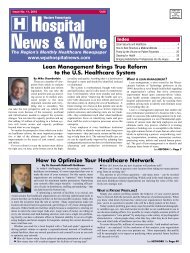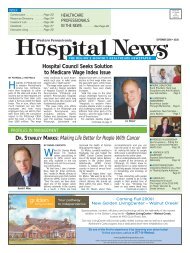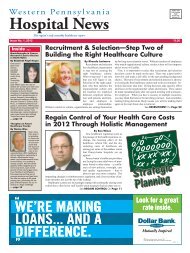McKeesport Hospital Foundation holds 33rd annual Invitational ...
McKeesport Hospital Foundation holds 33rd annual Invitational ...
McKeesport Hospital Foundation holds 33rd annual Invitational ...
Create successful ePaper yourself
Turn your PDF publications into a flip-book with our unique Google optimized e-Paper software.
22 | Issue No. 5wpahospitalnews.comHealth Information Technology for the PeopleIncreased recognition for patient-centered health IT, no road mapThe HITECH Act devoted $2 billion to healthinformation adoption to motivate the industry tospeed towards the health IT super highway. The fundsenables providers to improve care, lower costs, andprovide patients with personal information they canuse to manage their health. But a communication disconnectis hindering the process because there is noroad map to guide healthcare policy-makers, productdevelopers and providers toward accessible data andmaximum patient involvement. The issues surroundingthe absence of a definitive plan is the cover storyin the May issue of the Journal of AHIM (AmericanHealth Information Management).The HITECH Act—part of the ARRA stimulusbill—incorporates patient-centered ideas and setsgoals to advance health IT that can support patients’information needs. However, there is no businessmodel to develop a road map for patient-centered ITand the federal government’s long-awaited meaningfuluse definition is not robust enough to lead theindustry in the right direction.Health IT for the People reveals how the federalgovernment is relying on the private sector for expertiseto devise a plan while the private sector is lookingfor guidance from the government. Invariably, multiplehealthcare industry organizations have worked ondifferent patient-centered health IT tools, but to date,not a single organization has developed a road map.This article also includes a sidebar that definespatient-centered IT. It explains that while health ITtools are used to achieve healthcare that is patientcentered,the goal is to give patients the ability toaccess meaningful and useful information.The May Journal of AHIMA includes the practicebrief, “Guidance for Clinical DocumentationImprovement Programs,” which explains why anincreased need to interpret healthcare consumers’coded data for meaningful comparison and qualityreporting has led to the expansion of the health informationprofessional’s role in clinical documentationimprovement.Read these articles, our features, “Personal MedicalDevices” and “Accessing and Understanding:The Role of Health Literacy in Patient-centric HealthIT,” and more in the May issue of the Journal ofAHIMA or online at journal.ahima.org.AHIMA’s enduring goal is quality healthcarethrough quality information. Visit www.ahima.orgDuquesne University to Open Pharmacy in Hill DistrictA first in the countryPharmacy Dean J. DouglasBrickerBy Daniel CasciatoLast month, Duquesne University announced plans to open a pharmacy in Pittsburgh'sHill District neighborhood. The initiative will be the first off-campus,community pharmacy in the nation designed and operated by a school of pharmacy.“This pharmacy has the potential to bring some increased health care to apatient population that is definitely underserved and will also enhance their healthand management of chronic diseases,” says Dr. J. Douglas Bricker, dean of theMylan School of Pharmacy and associate professor of pharmacology.Expected to open late this fall, the pharmacy will be located in a 5,000 squarefootspace in the Triangle Shops Plaza on 1860 Centre Avenue. The Hill Districthas been without a pharmacy since 2000. It is expected to serve nearly 1,000 seniorswithin walking distance of the new facility. Duquesne University and theSchool of Pharmacy plan to invest more than $600,000 in the project. Renovationson the site will begin this spring.“Responding to the needs of others, particularly the underserved, is at the heartof Duquesne’s mission,” says Dr. Charles J. Dougherty, Duquesne University president.“This effort provides accessible, affordable health and education servicesdesigned to improve the health and well-being of Pittsburgh residents. It is also aunique opportunity for student and faculty community engagement, professionaleducation and clinical care.”For more than 85 years, the Mylan School ofPharmacy has been a leader in preparing graduatesto deliver comprehensive pharmaceuticalcare that promotes positive patient health outcomes.The school operates numerous communityinitiatives designed to prevent disease andimprove the health and well-being of communityresidents, particularly the underserved. Theseefforts exemplify the reputation of the MylanSchool of Pharmacy as a leader in pharmacy education,research and patient care.With a focus on health and wellness education,the school’s Center for Pharmacy Care offerseducational programs, medication therapy managementservices and health risk assessments forsuch chronic disorders as hypertension, hyperlipidemia,diabetes and osteoporosis. Since itsinception in 2002, the center has conducted health assessments on more than28,000 individuals. In 2007-08, the center: participated in 135 health assessment programs to more than 5,600 people. referred more than 1,000 patients to other healthcare providers for follow-upcare. provided monthly health assessments and education information to more than700 patients in Carnegie, Lawrenceville, Millvale, South Side Hilltop, the WestEnd and the Hill District, utilizing the The Spirit of Health mobile unit. administered more than 700 influenza vaccines. implemented a Hepatitis C identification program in Lawrenceville andSouth Side Hilltop.Pharmacy fellows and students flank, from left, Carl Redwood of the HillDistrict Consensus Group, Urban League President Esther Bush,Duquesne President Charles J. Dougherty, Pharmacy Dean J. DouglasBricker and, far right, Associate Pharmacy Dean Thomas J. MatteiThe pharmacy came about as an extension of two factors. One is the mission ofthe university to increase community service and the other is the fact that withinthe School of Pharmacy, one of its major goals is to increase the total comprehensivehealthcare within the community.“We can do that in a variety of ways,” says Bricker. “We have another center onour campus called The Center of Pharmacy Care, which looks at wellness and diseasestates, and that mission stretches out to eight areas in Pittsburgh that areunderserved. We do this through a mobile unit called the Spirit of Health, and nowwith the pharmacy, we are able to offer a more comprehensive approach to healthcarewithin the community. So from the vantage point of the School of Pharmacy,we're trying to implement health care providers within this area.”The pharmacy will be staffed by a director, licensed pharmacists, Duquesnepharmacy faculty, and student pharmacists.“This is not going to be your typical pharmacy layout with several aisles tobrowse products,” says Bricker. “This pharmacy will be devoted to counseling andpatient care.”In addition to providing affordable access to prescription medication, the pharmacywill offer private patient consultations, health and wellness education, medicationtherapy management services and health risk assessments. Bricker addsthat the pharmacy will be personal and patient-centered, offering a comprehensiveevaluation of individual needs. Residents will have the opportunity to meet withpharmacy team members on an ongoing basis to ask questions, set goals and monitortheir progress.“There will also be a small instructional classroom that will be used to educatethe residents in the community on chronic disorders such as diabetes and hypertension,”says Bricker.For more information, visit www.duq.edu/pharmacy.



